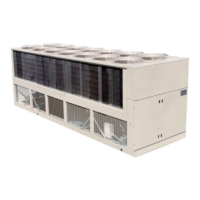Product Manual ALR2-3 ALR 110F – 150F 7
Figure 2, Zone Terminal Configuration
MONITOR
ADJUST
TIME SCHEDULE
PASSWORD
ENTER
Compressor 1
Compressor 2
Stage 3
Stage 4
Solenoid #1
Frzstat#1Alm
Frzstat#2Alm
MinLowPres#1
MinLowPres#2
Occupied
Flow Failure
OA Lockout
Cir#2Lead=On
Pmp/Stp #1=0
Lvg Water Temp
Evap Pres #1
Evap Pres #2
OA/AI3 Input
LvgWtr RBnd SP
Contrl Band SP
Actual Lvg SP
Unoccpd Lvg SP
OA Lockout SP
Lvg Low Lim SP
SoftSta Capcty
Cir #1 Starts
Cir #2 Starts
McQuay AGZ/AGR Global Chiller
INSERT 10
ON OFF
Display
Button 1
Mode
Selector
Panel
Mode
Selector
Button
2
AGZ-AGR
Display Indicator Dot
On/Off Status
3
Operating Mode Indicator
Up/Down Arrow Keys
Door
Display Item List
Warning Signal
ALARM
OA/AI3 HiLimSP
OA/AI3 ResetSP
Display Area 11
Display Area 21
Display Area 31
Alarm Light
Lvg Water SP
% Unit Load
SoftStart Time
Pmp/Stp #2=0
Solenoid #2
Stage 5 Opt.
Stage 6 Opt.
Optional MicroTech Control
The exclusive MicroTech microprocessor control is common throughout McQuay equipment. The
interface is a 12 key keypad and 2-line, 32 character backlit liquid crystal display. The MicroTech
continuously performs self-diagnostic checks on all system temperatures, pressures, and safeties, and
will automatically shut down a circuit or the entire unit if a fault condition occurs. The cause, time,
and date of the occurrence is recorded and can be displayed. The seven previous incidents are kept
in memory for service reference.
If a fault occurs, the controller takes preventive measures in an effort to keep the unit operating;
staging down capacity, activating a pre-alarm signal, and automatically switching to the alarm menu on
the display. Pre-alarms are self-clearing when the fault condition is no longer present.
Critical shutdown alarms such as high condenser pressure (with mechanical back up), freeze
protection, oil pressure (with mechanical back up), and low evaporator pressure are manual reset and
must be cleared at the keypad to resume operation.
Choose the MicroTech control and Open Protocol options to interface with virtually any building
management system and perform remote monitoring and control by hard wiring or modem. A nominal
site license fee is required for a Building Automation System (BAS) interface.
A single chiller can connect directly to the BAS. Two or more units will require an Open Protocol
Panel (OPM) for connection.
Thirty feet of sensor cable is included, rolled up in the control panel, on remote evaporator models.
The cable can be field spliced for a total run not to exceed 75 feet.

